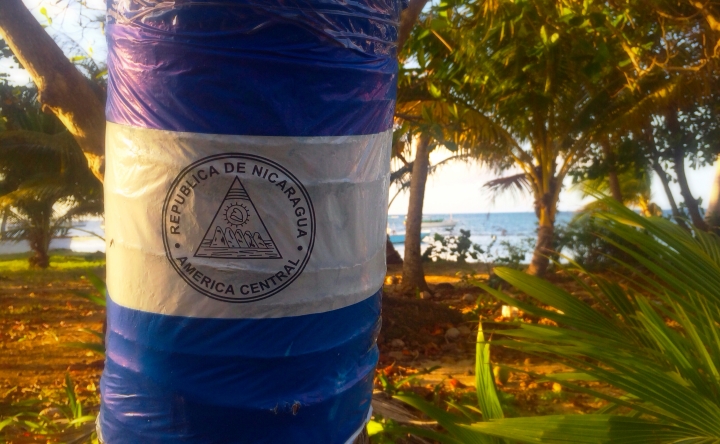The other day, watching the outpouring of tourists from the tiny airport here on Corn Island, I began to wonder about what it is that makes people want to travel. To here. To any place.
Impetus to errantry
Every day there are two flights from Managua to the island, and every day those flights are over half full (optimistically speaking) with tourists and travelers (if you believe in that distinction). Many of them, at least in this season, are from the United States and Canada (an astonishing number of them, in fact, are Canadians — it’s as if it’s cold and miserable there in winter). In other seasons, Europeans comprise the bulk of the bunch. But no matter where you come from, getting to Corn Island is no hassle free expedition. It’s a logistical tangle of medications, vaccinations, flights, layovers, and the bureaucracy of international travel.
Before we moved here, when we were talking with some friends about what we wanted to do here, one of them asked us what exactly people come here for, if they’re not coming for diving or the like. What do they do here, he wanted to know? I thought for a moment, then I told him I didn’t know.
His question is interesting, not just for this tiny Caribbean island, but for any destination that people spend their hard earned money and time to get to.
What makes us want to fill our free hours with trips across the state, across the country, around the world?* If, in every free moment, we desire to be somewhere else, why make not make our home in some place we might want to spend time?
Home is where the bills are
Someone once told me that no matter where you make your home — whether on the beach, in the backwoods, in the city, in the suburbs — no matter what the place is, it still becomes the place where you take out the trash, do your laundry, and pay the bills. Home becomes mundane. I think we all hear the irony in the cliché, “The grass is always greener on the other side.” We know that no matter where we go, it will always be basically the same.
So why do we try? Why travel at all? People come here, to Corn Island, they drink, they eat, they sit, they talk, they walk, they look. They could do all of those things at home. And sure, there are beaches here, the weather is nice, the scenery is a bit more pleasant to look at than, say, Southern Illinois. But still, we spend the bulk of our time in other places doing things that we could easily do at home. (Yet we don’t do many of these things at home. When was the last time you took a walking tour of your home town and learned about its history? When was the last time you sat down anywhere near your house and just relaxed for an afternoon? For a day? For a weekend?)
But these questions don’t get to the root of the issue, I don’t think. Because when we travel and do these things that are, at home, mundane, we don’t feel as though they’re mundane. Walking the Champs-Élysées, I would assume, feels somehow more meaningful than walking down University Drive in Auburn, Alabama.
In New York, Paris, São Paulo, Marrakech, Taipei, (assuming you don’t live in any of those places) we find something more than we find at home. And even people who live in places the rest of us envy feel the urge to get away and see other places. There is something driving us on to these journeys.
Pico Iyer (him again), in The Lady and the Monk, calls it “whatever curious affinit[y] propel[s] us towards people or places we have never met.”
Curious affinities
As I see it, there are two main motivations for travel: initially there is the urge to see what’s different; later there’s the urge to see what’s the same. We want to see the exotic or we want to see the familiar in the exotic. The second is a more acute way to appreciate the world, and more rewarding.
I think that seeing differences is the initial mode of observation. These are the third-person plural observations. We go somewhere and we say look how they cook this, look what they wear, look how they live. We see everything about the place that is new and therefore intriguing to us. We fill Facebook with pictures of these things. We are visitors to the zoo of other people’s real lives. We ogle. We are “tourists.”
But beyond that initial phase, if we spend the time or make the effort, we begin to see the similarities between the “normal” and the “exotic.” We see shared humanity. My uncle goes to South Africa and comes back to tell us how people there eat grits, just like people in Alabama, they just call it something different. We use the first-person plural. We say, look how we all live the same way, share the same needs and desires, the same struggles. We begin to share in cultures and traditions. We are welcomed to some degree. We travel, and we learn.
The first mode of observation, the distancing mode, is often the drive behind going somewhere new. But to experience the world in this way is superficial. We don’t need to be estranged from our fellow humans anymore than we already are. The value of travel comes after we have left home, when we are able to begin to see ourselves as part of the whole. Good travel photography (e.g.), unlike our haphazard “look where I went” albums on Facebook, functions the same way: it captures the familiar in the exotic, and presents us with a shared vision of humanity. (Even when it shows conflict — “Look! They get mad the same way we do, and about the same things!”)
Terence famously wrote, “Nothing human is alien to me.” To travel well is to be daily reminded of this. And whether this is the actual motivation for much of the traveling we do (and I think it isn’t), it’s at least the ideal — it’s what travel can be and can do. And it puts my mind at ease for now.
____________________
* I know that I’m speaking from a position of privilege here. Not everyone can afford to travel out of their hometown. But even those who can’t travel recognize their sessile lifestyle as a peculiarity, whether they do so with pride or with regret.


I like how you address the mundane. I agree that wherever we make our home eventually becomes mundane, no matter where we live. I live in Japan and sometimes I feel the same as I did when I was in America because I have to do all the same daunting chores as I did when I was there.
However, I think a big thing is not just escaping something but finding something. I left to get away, sure. To see new sights and meet new people. But I keep coming back to Asia for all of the things that I can only find here. Good food, instant friendships if someone speaks your language, instant friendships if someone doesn’t, but wants to learn. I come to find delicate beauty, fellow fans of the music groups I like, fashion trends, literature. I travel to find just as much, if not more than, I do to get away from the mundane.
Living abroad is so interesting because I feel as though I am half-tourist, half-local. I fall into a mundane routine, sure, but I don’t have to travel far to experience something new and different.
Traveling to find sameness is definitely a big part of it, but it’s so much more than that. I love finding authentic dishes, good karaoke, going to concerts, etc. And when I am in America, I always long to be back here. But when I am here I always get a hankering for a good burger. Or at least recognition that I am not a complete alien.
I think you’re right. In my zeal for emphasizing “shared humanity,” etc., I ignored the fact that it’s often the quaint differences that imbue a new place with so much charm.
I like how you set it up as escaping something versus finding something. I think that’s a useful distinction. I also think that “finding something” is a way to make the most of the differences we find in our travels. Instead of ogling, we integrate the differences into our own experience — we find a new food, new music, or a new custom we love and we make it part of our lives.
How long have you been in Japan? I’ve just moved to Nicaragua, so I’m new to this whole living abroad thing.Do you think there ever comes a point when you stop feeling half tourist and half local? I suppose that might depend on the culture you come from and the culture of the place where you live.
(P.S. I’m reading “The Lady and the Monk” by Pico Iyer right now. It’s about a year that he spend in Kyoto. It has a lot of insights into the culture and musings on why things are the way they are. I’ve never been to Japan, but I’m enjoying the book a lot. You should check it out if you’ve never read it before!)
Oh, I’ve never read The Lady and the Monk! Thanks for the recommendation!
Wow thank you for your thoughtful reply! In my case, I started traveling and studying abroad as a high schooler.
Especially in a homogenous place like Japan, being white definitely makes me stand out. Everyone stares at me. Even when they pretend like they aren’t. I don’t know if I will ever get used to it. I have days where I’m happy I stand out and then I have off days where I wish everyone would just stop looking at me.
But I speak fluent Japanese, so most of the time after I open my mouth they stop treating me as a complete tourist. And I live here, so to me it’s my home. But usually it’s others who point out that I’m different. People who know me don’t treat me any differently, but people without any experience with foreigners are really awed by the fact that I learned Japanese and usually just have this stereotype that I can’t use chopsticks, etc.
I think Pico Iyer touches on the feelings you have as a traveller. He talks about how even though you feel a place is your ‘home’, if others disagree, then you have a conflict inside you as to where you really belong. I read The Global Soul and it was really good.
Great post. Thanks for sharing your thoughts on travel and curious affinities. You explained it well.